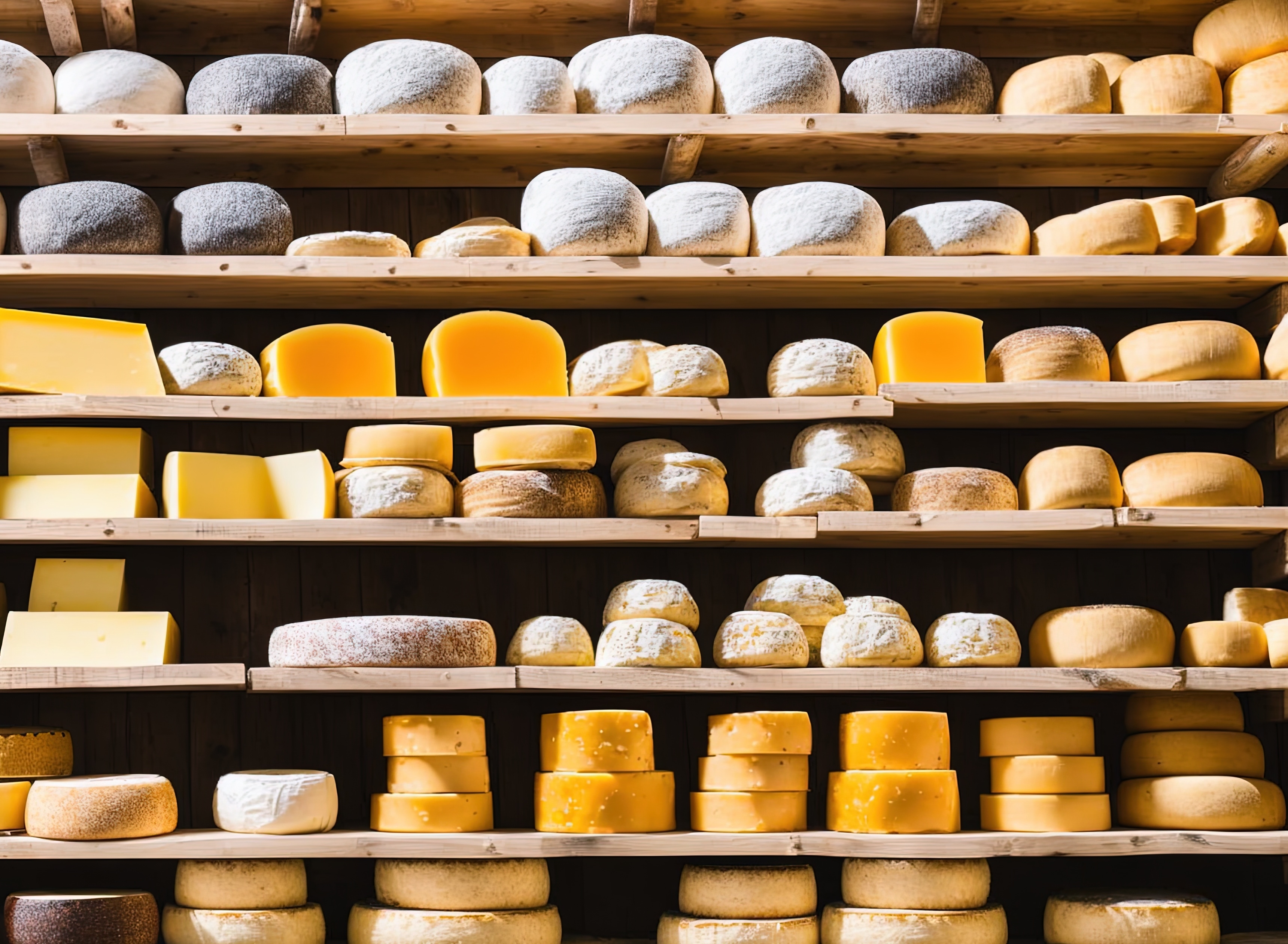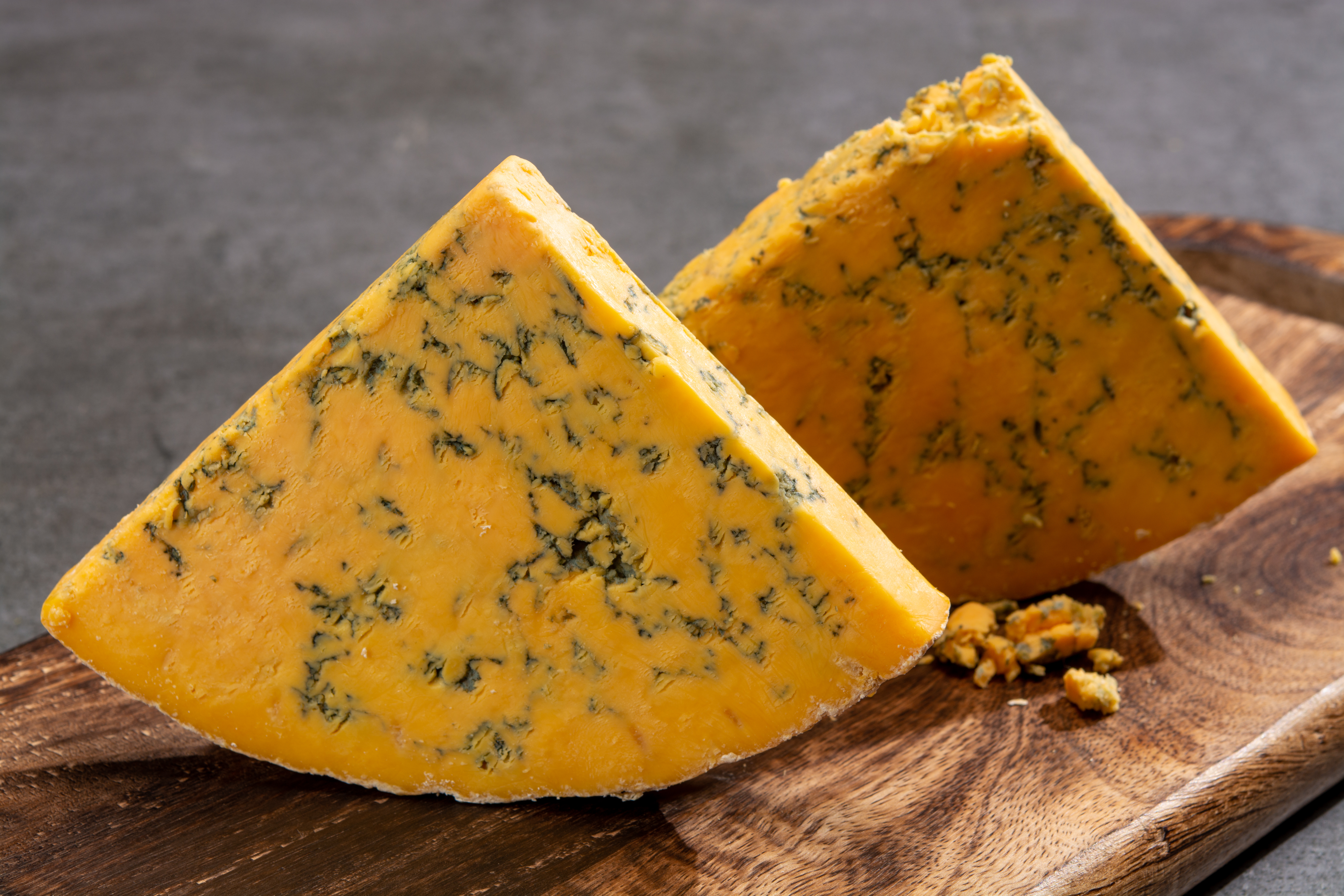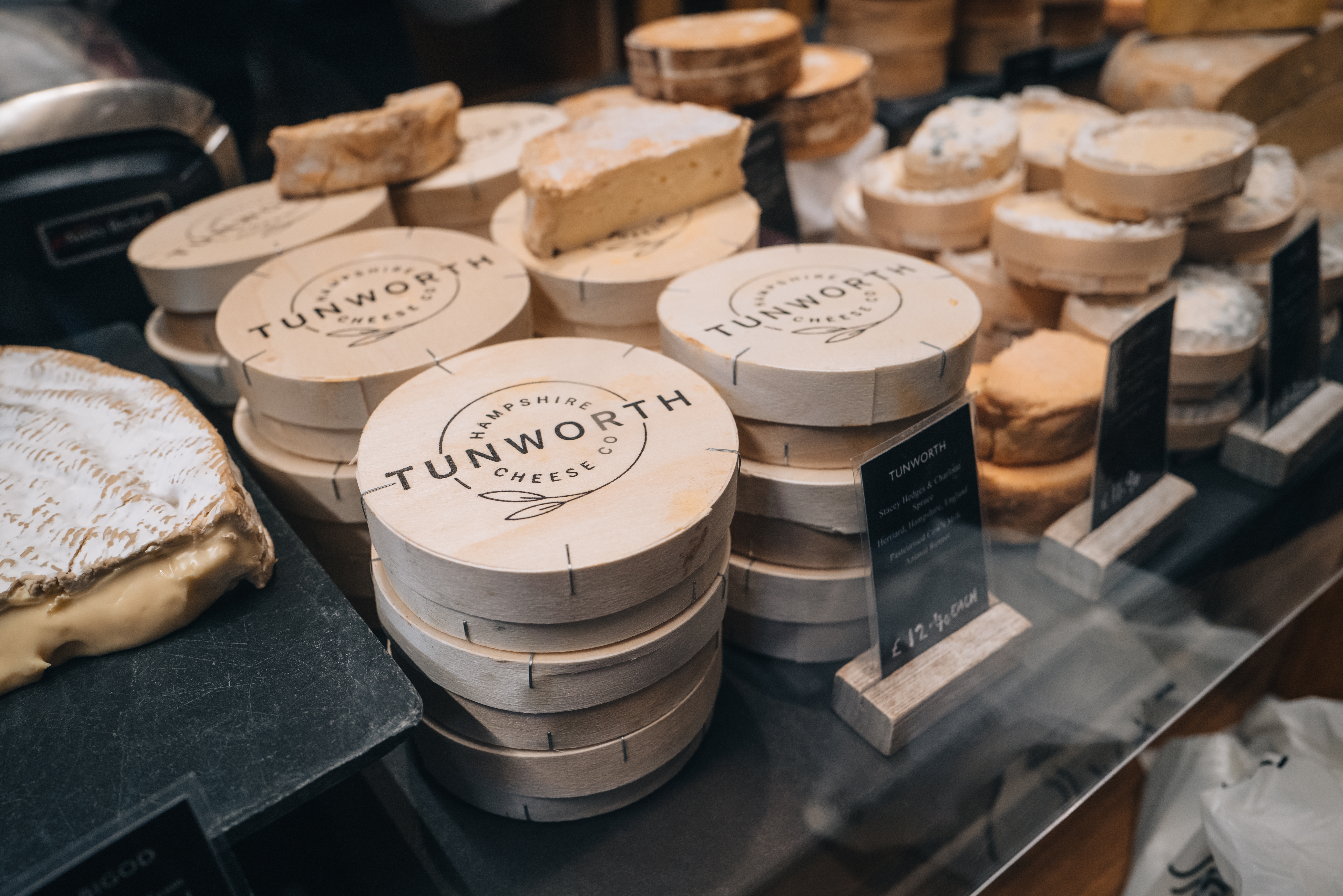Free digital copy
Get Speciality Food magazine delivered to your inbox FREE
Get your free copy
Dainty, ripple-edged goats’ cheeses with mousse-like pastes. Fudgy blues, mottled with painterly waves of penicillium roqueforti. Dense, savoury, brothy Cheddars. The cheese landscape in Britain is remarkable. A constantly evolving patchwork of more than 800 varieties (and counting).
Where 30 or 40 years ago, the average deli or high street cheese shop would look to the Continent to furnish its selection, drawing upon the great Bries of France, and enormous wheels of Parmesan from Italy, supplemented by a smattering of West Country Cheddars, today the tables have turned. Britain’s vast and unique collection continues to take centre stage.
An edible slice of history
One of the biggest draws to British cheese, for both cheesemongers and customers, is its heritage, old and new.
“I always say, whenever I do tastings, that cheese is such a big part of our history, culture, nature and science, all together in one bundle,” says Peter Pooley of Cheese and Bees in King’s Lynn.
“We’ve been making cheese here since at least the Roman times, and the sheer variety we do is just phenomenal – especially when you think about the fact cheesemakers have been through so much adversity throughout the years for a variety of reasons.”
Something Peter personally loves about the industry is the finding and revival of ancient handwritten recipes, which really do point to the past. “For example, Monkland Cheese Dairy in Hereford are making Little Hereford cheese. The recipe went missing and was found in someone’s loft. I think that’s incredible. There could be hundreds and hundreds of unknown cheeses lost in history, and it’s amazing when they get brought back to life.”
Reviving these cheese recipes, as they are found, proves a great source of pride for makers, Peter adds, saying he feels an equal sense of pride being able to give customers a taste of the past. “I think these cheeses say something about the British way of not giving in, not giving up.”
French native Emmanuelle Metz of Metz Cheesemonger in Farsley naturally has an ingrained affinity with the cheeses of her home country, but has fast fallen head over heels for British varieties, becoming a staunch supporter of the makers working around her in the North of England.
She feels part of her ‘calling’ as an independent cheese retailer is to raise awareness of British cheese – how delicious, and how important it is.
During a recent Heritage Open Day at the historic mill the shop is based within, Emmanuelle made it her mission to educate as many people as possible. “I was saying to them ‘celebrate your culture, these are your roots’.”
In a globalised world, where consumers can easily buy products from the most exotic and far-flung of places, Emmanuelle feels shopping local, and supporting local, homegrown producers is more vital than ever, particularly when it comes to health.
“The importance of British cheeses is to bring back the right food on our plate,” she explains. “If you eat something that is made with a slow process, with respect through the chain for native animals, the land, the farmer, that has to be better for you.”
Until just five years ago, the cheesemonger says she had no concept of the breadth and quality of British cheese, adding that she’s buoyed by the “vibrant energy” of makers here, and that she’s attracted to the fact cheeses in the UK have their own identity.
“They have their own names and their own vocabulary. I really think we should stop saying, ‘it’s like a Reblochon, or it’s like a Brie’, stop comparing British cheeses to Continental ones. Sometimes I hear people saying British cheeses are substitutes for French cheese but I don’t agree with that. They are unique. The uniqueness comes from the grass and the soil right on our doorstep.”
Paul Donoughue of Green & Lovely only opened his shop in East Molesey three years ago, but says what has struck him most about the cheese industry, apart from its importance in British culture, is the kindness he’s experienced. That is something he thinks should absolutely be celebrated.
“It’s the only industry I’ve ever known where people are so completely supportive of one another. In other industries competitors are competitors. You like it if something goes wrong for someone else. But in cheese, if something goes wrong, everybody gathers round and helps. Also, nobody does it for the money. There’s something beyond money that keeps people involved. It’s a passion.”
This passion rubbed off on him immediately. “I love it. It’s a bizarre thing getting to see the enjoyment cheese gives people at the counter. I can’t imagine any other food item getting the same result, and that’s incredible.”

What customers expect from cheesemongers is always shapeshifting. But, equally, what’s available to them, especially within British cheese constantly changes. It’s the job of independent retailers, says Paul, to veer consumers away from the ‘usual suspects’ out of their comfort zone.
That could be introducing them to new blues, sheep’s milk or goats’ milk cheeses, or opening their minds to better quality, British versions of what they usually buy at the supermarket.
Paul has plenty of regular customers who might have visited once, baulked at the prices of his cheeses, bought them from a multiple, been disappointed, and returned to him, tails between legs, wanting to taste ‘the real thing’. “I think, in terms of sales, there has been increased awareness of the value of the products and understanding that, yes, you can go and get them from the supermarket, but at an independent cheese shop they’ll always be better,” he explains.
A case in point is Cheddar, and Paul says he’s seeing an ‘awakening’ amongst customers that it’s not just a ‘filler’ to be plonked thoughtlessly on the cheeseboard. They’re more willing to try a few Cheddars, noticing and tasting their different nuances. The trend here, he adds, is towards mature and vintage types. “People want stronger flavours.”
Also experiencing growth, he adds, are British goats’ and sheep’s milk cheeses. “Lots more people are coming in and saying, ‘I don’t really want to eat cow’s cheese, goats’ cheese is kinder to my stomach. And we’ve seen a complete vanishing of requests for vegan cheeses, I’m delighted to say!”
At Cheese and Bees, Peter has noted that his customers very much want to discover more about the makers and stories of the cheeses he stocks. “They really do want to know about the people behind these products. Someone said to me the other day, ‘does Norfolk have a particular type of cheese made in this area?’, that’s becoming so common. There are so many special regional cheeses, like Caboc from Scotland or proper Caerphilly from Wales, that aren’t found in supermarkets, and they are very important to us.”
Emmanuelle thinks British consumers are slowly cottoning onto the fact several native cheeses are seasonal. These types should be heralded, she thinks, anticipated in the same way as the first flush of asparagus or summer berries.
“We should learn to wait for these moments patiently if we want cheese at its best. British cheese is, to me, like a nice clock, with different types coming back to the counter as the months change. I’ve had people say to me, ‘oh, I don’t like this cheese’ and I’ll say, ‘when in the year did you try it?’. They might have it again and say, ‘I really like this’. We have to help people to understand they could love a cheese in summer and not like it in winter.”

Neal’s Yard is spearheading a national campaign to raise awareness of British territorial cheeses – the likes of Cheddar, Caerphilly, Red Leicester, Wensleydale, Stilton, Cheshire and Lancashire.
It appears they’re an easier ‘sell’ closer to the places where they are made, for example up in Yorkshire at The Courtyard Dairy, where owner Andy champions them front and centre of his displays.
Down in the South of England where Paul’s shop is based, it’s hard to veer customers away from creamy, more Continental style British cheeses.
His greatest success is with Cheddar. “When people say, ‘boring Cheddar’, they’re thinking about the yellow, plasticky ones they’ve had from supermarkets, and those don’t have anything to do with real Cheddar – the likes of Jamie Montgomery or Mary Quicke making the real deal. We’re constantly fighting a battle because the word, ‘Cheddar’ is overused.”
Getting customers to try different makers’ Cheddars side by side is a useful selling tool, Paul adds. Then they can truly experience the differences for themselves. “I’ll tell people the next time they reach for a ‘plastic Cheddar’ to remember it could have come from 10,000 cows, whereas about 100 cows’ milk has gone into a Keens, for example, from the land next door. I think proper Cheddar needs to be properly isolated from the rest of the market to get the recognition it deserves.”
In an independent retail setting, consumers get the whole picture behind territorial cheeses, Emmanuelle adds. The beauty of these cheeses is in their stories and their romanticism – things that cannot be explained standing in the bright lights of a supermarket multideck. She gives Stonebeck Wensleydale as an example. “This cheese is just amazing, and they do such a brilliant job. When you give people a piece they say, ‘oh wow’, and I tell them how it’s from a really small farm and you won’t find it in supermarket. They appreciate that.”

It’s not enough to simply stock cheese these days – everyone wants an experience, be that cheese and wine pairing events, dine-in options, or even fondue hire. One way a growing merry band of cheesemongers in the UK is differentiating themselves is by diving headfirst into the art of affinage – taking British cheeses and giving them subtle (or bold), transforming them into something that cannot be bought in any other shop.
Practising affinage is a daily part of running a cheese shop in France, and something Emmanuelle has brought to her own business, working with other producers close by to put a Yorkshire stamp on some of her range. She encourages others to do the same. “I feel like it’s transforming something into your own territorial, and you create something new in the identity of your place, your village.”
In affinage you should aim, she adds, to create the very best – products you would be proud, she says, to present to your mother. Emmanuelle likens it to a dance. “When you really like a cheese and you want to give it your own little twist, it’s like taking it on a dance, you just have to decide on the perfect dance partner. One I’ve got at the moment is Highmoor soaking in stout. And something very popular was our chocolate bon bons. One was Stilton and quince dipped in chocolate, another one had some triple cream cheese with chilli jam, and one of my favourites was Glaston Brick with candied lemon and verbena in dark chocolate. Chocolate and goats’ cheese is just amazing.”
To others, Emmanuelle says affinage is just a matter of confidence. “Allowing yourself to do something new can create something very special.”
A wholesaler’s perspective
Robert Bowden, UK sales manager at The Fine Cheese Co gives his take on British cheese
Are consumers seeking out more British cheese?
Where once we were a nation happy with a mild cheddar or a supermarket Stilton, customers have become more discerning and are seeking out British-made cheeses but with unique character, a story, and something a bit different.
There is a lot of enthusiasm around alpine-style cheeses like the excellent Burford from King Stone Dairy, Raclette-inspired cheese like Ogleshield from Montgomery but also grass roots cheeses like Yoredale Wensleydale from Curlew Dairy are seeing growth.
Why the shift? Partly it’s driven by foodie culture. TV chefs, TikTok cheeseboards, social media and restaurant menus are expanding what people expect from cheese.
Which cheesemakers are you excited about at the moment?
King Stone Dairy is quickly making a name for itself with its French-inspired approach and standout new releases like Bibury and Hidcote.
Meanwhile, Fen Farm Dairy, long known for its beloved Baron Bigod, continues to expand its repertoire with Raedwald, a washed-rind cheese that’s rich and savoury.
Whilst there are many others, King Stone and Fen Farm are pushing boundaries with the styles of cheese that they are making, especially with the discerning customer in mind.
The new generation
Leona McDonald, director of Golden Hooves says regenerative farming should be a future of British dairy
“Regenerative farming is fast becoming a cornerstone of the UK’s food future. By restoring soil health, improving biodiversity, protecting waterways and capturing carbon, these practices help safeguard both the environment and the resilience of our food system. The approach isn’t new - it draws on long-standing traditions of working with nature rather than against it - but the urgency is greater than ever as farmers respond to climate change and rising consumer demand for genuinely sustainable food.
Within British cheesemaking, regenerative methods play a vital role. Healthy, carbon-rich soils and diverse pastures create richer, more complex milk, which in turn supports high-quality artisan and larger-scale cheeses. Farmers focusing on regenerative principles also strengthen rural communities by improving long-term productivity and reducing reliance on costly inputs.”